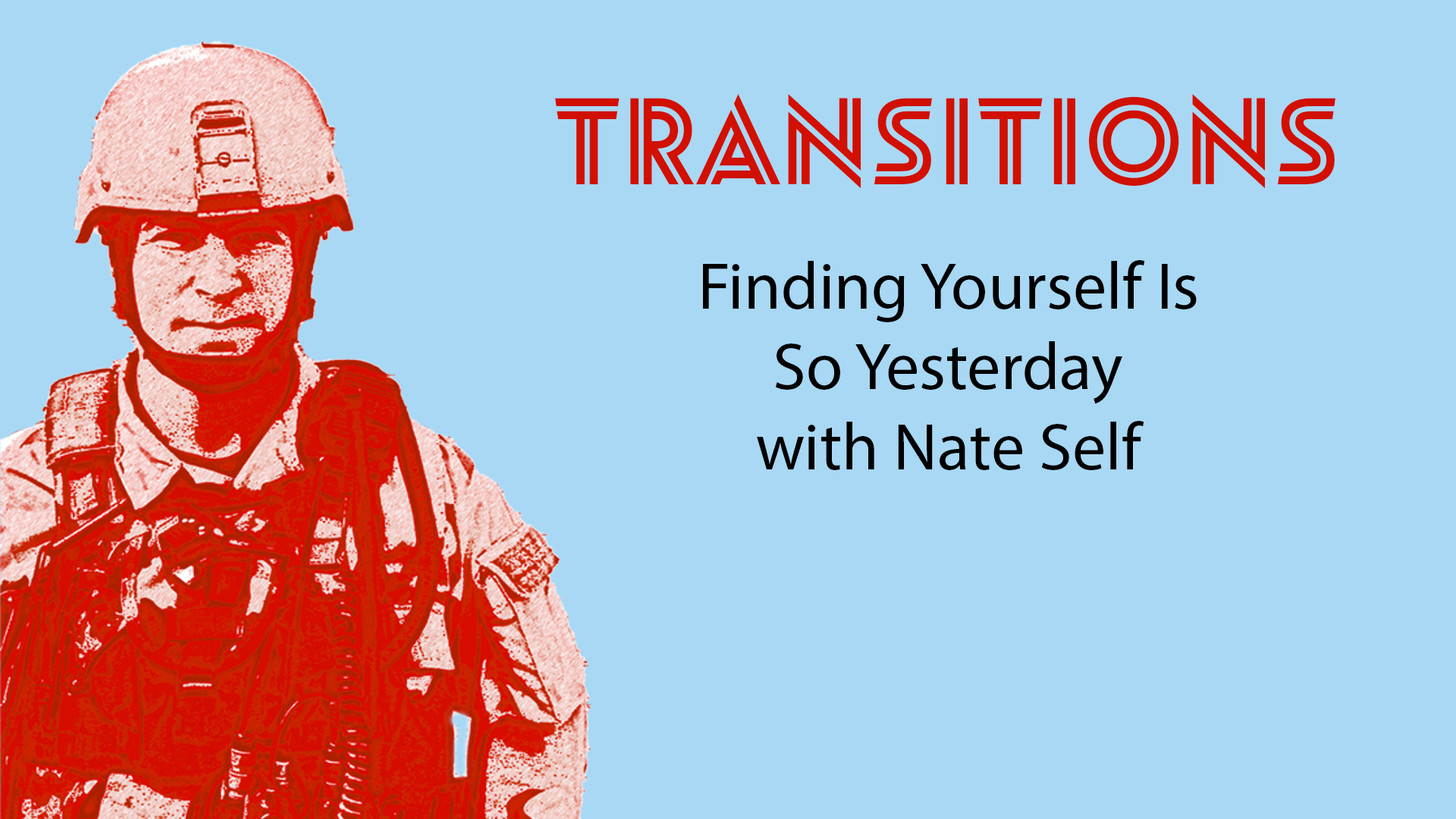Like an acorn, even the best managers become something else one day. Listen to a war hero describe coming down from the mountain, forging a different path, and thriving.
Show Notes
Transitions: Finding Yourself Is So Yesterday
Transitions are tough, even if you are a war hero. In this episode of Management Muse, former U.S. Army Special Operations (Ranger) officer and founder of the management consulting firm Praevius Group, Nate Self, talks about the most challenging transitions in his life, and shares his advice for more smoothly navigating work and home transitions.
Episode Highlights
- Transitions can be: Structured or unstructured, abrupt or deliberate, and voluntary or involuntary.
- When possible, try to consider the complexities of transitions before making them.
- Abrupt and involuntary transitions are often particularly jarring.
- Group membership and other external resources, such as family, communities, religion, hobbies, etc, can provide critical support and stability during transitions.
Timestamps
[1:30] Nate speaks about the two hardest transitions he has made in his life.
[1:43] Nate gives examples of different types of transitions, including structured vs. unstructured, abrupt vs. deliberate, and voluntary vs. involuntary.
[4:35] Nate shares how transitions can shape our identity.
[6:25] Nate talks about the importance of considering the challenges and complexities of transitions before making them.
[6:44] Nate discusses the reasons for programs to help veterans transition.
[7:46] Nate shares his transition out of the military.
[8:07] Nate talks about how he underestimated his transition from military to civilian life.
[9:50] Nate describes the value of considering important relationships during transitions.
[10:39] Nate talks about prioritizing healthy routines during transitions.
[13:26] Nate shares recommendations for managers, leaders, and organizations to help individuals make good transitions.
[16:26] Nate talks about the role of community in transitions, and the value of not making major transitions alone.
[17:56] Nate speaks about having “anchors” during transitions and shares his examples.
[20:03] Geoff describes multiple role theory, and how it relates to transitions.
[23:07] Nate shares how his roles shifted when transitioning from the military.
[25:54] Nate explores how an everchanging world affects the pace of transitions.
[28:35] Nate speaks about openness during transitions.
[30:29] Cindi shares an example of how one person’s transition can spur transitions for people close to them.
[31:07] Cindi talks about the uncertainty that often accompanies transition.
[32:32] Nate shares examples of abrupt and involuntary transitions, the panic they can cause, and the need to reach out for help.
[33:57] Nate talks timing in transitions.
[35:07] The group discusses how a fear and pessimism can inhibit positive transitions.
[36:44] Geoff notes that managers are often the instigators of abrupt change for other people, and Nate shares how managers can blunt some of the counterproductive impacts of fast change.
[39:15] The group discusses final transition advice for managers.
[41:45] Nate shares how other people helped him learn to manage transitions.
Episode Quotes
“The number one thing that’s at stake in your transitions is the relationships that you have. I think it’s the most important part of our lives. Our jobs are typically the source of most of our transitions… But there are some transitions that are relationship-based, and those are the most painful ones. Sometimes, when we change roles or we change jobs, we unknowingly have collateral damage in our relationships. So, that’s one of the things I would want to emphasize: You have to account for your relationships first.” – Nate Self
“The idea of having some sort of external resource is an important one. It’s kind of like you’re in a boat and you carry an anchor along with you. You can still sail, but knowing you have that anchor—something that you can throw outside the boat if you need to stop and say I don’t want to move anymore or I need to sit where I am.” – Nate Self
“There’s one point about transitions: It’s almost like, you’re out on a run on a road… You’re on a smooth road, you go fast, and you can almost close your eyes and go into a trance because you can see the path, and it’s easy. But then, when you want to get off of the paved path, and across some trail to get to [another] road, you have to slow down. You have to watch out. It’s very technical. You’re gonna fall. You could hurt yourself. You have to slow down and pay attention to all of that. You can’t go at that speed.” – Nate Self
“People have a tendency, when they feel uncertainty, to just make a decision, even if it’s a bad decision, because they just want to get out of uncertainty. Discipline yourself not to do that. Live with uncertainty and get yourself in a better spot.” – Cindi Baldi
About Nate Self
Nate is a former U.S. Army officer and founder of the Praevius Group Nate graduated from West Point with honors and served on active duty in Germany, Kosovo, Afghanistan, and Iraq.
Nate speaks extensively on the topics of transition and personal growth, and he lives in Central Texas with his wife and four children.
KW: transitions, management, leadership, uncertainty, relationships, community, support systems, decision making, problem solving
Resources
Ashforth, Blake. Role transitions in organizational life: An identity-based perspective. Routledge, 2000.
Kyprianides, A., M. J. Easterbrook, and R. Brown. “Group identities benefit well-being by satisfying needs.” Journal of Experimental Social Psychology 84 (2019): 103836.
Brook, Amara T., Julie Garcia, and Monique A. Fleming. “The effects of multiple identities on psychological well-being.” Personality and Social Psychology Bulletin 34.12 (2008): 1588-1600.
https://culsure.com/coaching/
https://ondemandleadership.com/executive-team-building/


